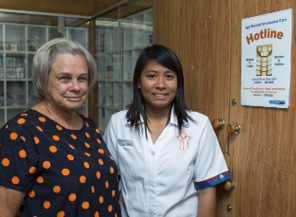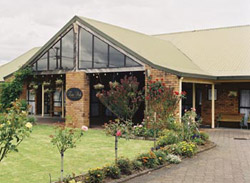A pilot study involving Counties Manukau District Health Board has helped shape changes to better support the region’s aged residential care (ARC) nurses, and include a team of gerontology clinical nurse specialists, a telephone support hotline and a buddy system to support ARC nurses. The changes are contributing to better care for residents in an increasingly complex environment, nursing leaders say.
On this page:
- Telephone hotline provides guidance and support
- Observation guidelines help tighten up clinical processes
- Buddy system provides education and support
- Pilot strengthens relationships
- Medication reviews and the importance of falls prevention
Telephone hotline provides guidance and support
Title: Showcasing Aged Care Nursing: Counties Manukau – Pilot provides building blocks for integrated approach.
[The video shows Noelene from Counties Manukau DHB talking to Marie, a registered nurse. Noelene is showing Marie the Observations Guidelines for Aged Related Residential Care.]
Noelene Whitehead: The other thing to be really mindful of is to check with the caregivers whether there’s been any subtle change in behavior. Because even the littlest thing, like they might be slightly more drowsy–
[Interview with Noelene Whitehead, intercut with the scene where she talks to Marie.]
Noelene Whitehead, Counties Manukau DHB: The whole programme is designed to support clinical and professional development around assessment. The support programme includes our clinical nurse specialists spending some time once a week for four weeks in the facility, assessing complex residents that the facilities may be struggling with, demonstrating the assessment skills to the nurses that work in the facility, and then supporting and assessing them to see that they feel confident to carry on so that we continue to develop the nurses’ skills rather than take over.
It’s really important that we work with the sector, not come in and do to the sector, because it’s a very specialist area of nursing. And even within health of older people, it’s its own specialty area. So the skill sets that the nurses have in residential care are very unique. And it’s a matter of building on those, not devaluing them.
[Interview with Marie Ocoma.]
Marie Ocoma, Registered Nurse, Takanini Lodge: As a registered nurse in Takanini Lodge, the program of the ATRACT has been valued by our registered nurses because it boosts our confidence in assessing the patients, especially with the complex patients in the facility.
[Interview with Yvonne Kleyn, intercut with shots of Takanini Lodge.]
Yvonne Kleyn, Manager, Takanini Lodge: For us at Takanini, we’ve needed to develop a relationship with our DHB in the assessing of our residents because it becomes important that we keep them holistically. We have advanced care plans and care planning around their needs. And so for us to ensure that the residents get optimum high-standard care or quality care, it becomes essential that we assess our patients in total.
Part of that assessment process is we include the DHB in the form of the gerontology nurse specialist or team that support our services. Because in past years, we haven’t had the support as we have now. And that’s led to a very positive care for our residents. It’s given us the ability to provide that high-quality care.
[Yvonne’s interview continues, intercut with footage of Marie calling the Age Related Residential Care Hotline.]
The hotline has been really good for us. We can address issues immediately without having to wait for referrals. And often the gerontology nurse specialists are available and will come on-site almost immediately. Our main goal is to achieve clinical excellence, so that supports us in our goal.
In the form of the training with the ATRACT training programme, it’s allowed our nurses to develop confidence in the way they discuss and assess their patients because it’s based on reflective practice, goal-setting, and also the evaluation tools that they do get in order to assess the patients fully, with the support of the DHB. Past years, we haven’t had that support, often having to deal with complex patients in difficult situations, whereas today we have the gerontology team that can help us initiate treatments and also support us in the assessment and the planning of care.
Lorraine Hall, a Counties Manukau District Health Board (CMDHB) clinical nurse specialist, is often the person who picks up the region’s hotline phone for aged-care nurses. The DHB runs a parallel hotline that enables GPs to consult directly with a community geriatrician.
Often nurses working in aged care can’t get instant access to the GPs who are supporting their residents. The Monday-to-Friday hotline provides a welcome alternative for advice and guidance.
‘Before the DHB rolled out the hotline across aged-care facilities in its catchment, there was a “them” [DHB staff] and “us” [aged-care nurses] approach, with a great big chasm in between,’ Lorraine says. ‘The hotline says “Hey, we’re there for you; we’re just at the end of the phone.”’
Currently, the hotline averages around 50 calls a month. However, Lorraine says there are times when it is used a lot more. For example, the hotline’s hours can be extended to include weekends if Middlemore Hospital is at capacity.
Often advice will include discussing a resident’s vital signs and offering suggestions for further investigations. The service can also help fast-track residents through the hospital system where necessary.
Takanini Lodge rest home clinical nurse manager Rod Manalo arrived recently from the Philippines. Rod is a regular user of the hotline and appreciates the support it provides. And the rest home’s manager Yvonne Kleyn agrees. ‘If staff have done a full assessment and are wondering “where to from here?”, then we’ll call the hotline for further input,’ she explains. ‘They help us. If it’s urgent, we can get tests, further assessments or whatever’s needed done quicker through them.’
Observation guidelines help tighten up clinical processes
Observation guidelines are a helpful aid for picking up health issues before they become difficult to manage. They give structured advice on what to do when vital signs such as temperature, heart rate, respirations and infections go beyond ‘normal ranges’. This might include notifying a doctor or taking a new treatment approach.
Lorraine Hall is a Counties Manukau District Health Board (CMDHB) clinical nurse specialist. She helped develop the guidelines to assist ARC staff but says nurses must always use their on-the-ground assessment information first. ‘The guidelines can only ever guide a nurse’s practice and do not replace the need for clinical judgement, which puts the whole situation into context.’
Takanini Lodge rest home manager Yvonne Kleyn says that the observation guidelines have had an impact on how they assess and care for residents. ‘Now we give a more structured review of the patient.’
Noeline Whitehead is CMDHB community geriatric services clinical nurse director. She says that the guidelines also encourage nurses to look at a person’s advanced directives. This is a document that details a person’s health care wishes, including resuscitation orders. The directives can include details about whether a resident wants to be hospitalised if they become unwell.
‘Just because they develop pneumonia and the antibiotics don’t seem to be working, it doesn’t mean they necessarily want to be in hospital. They may want to be nursed in a more comfortable environment for them – and that’s an important consideration, too.’
Buddy system provides education and support
A buddy programme is also offered to Counties Manakau’s nurses working in aged care. During this four-month programme a nurse specialist will visit weekly during the first and third months. ‘The model for us is to “do with” not “do to” and I tell my team that we should be up-skilling these nurses so we’re doing ourselves out of a job through our coaching and mentoring,’ CMDHB community geriatric services clinical nurse director Noeline Whitehead says.
CMDHB geriatric services clinical nurse specialist Jane Hsu was partnered with Rod Manalo from Takanini Lodge late last year. Rod is a highly experience registered nurse from the Philippines, but a recent arrival to New Zealand. He says the support has been valuable as New Zealand’s aged-care model is very different from the Philippines where more often older people are cared for at home by family members.
‘The extra training is an asset for the nurses.’
CMDHB also run a monthly two-hourly education forum. These forums cover a variety of topics for ARC nurses, including administering antibiotic fluids intravenously. Training ARC nurses to administer intravenous antibiotics has meant residents do not need to go to hospital for the procedure as it can be carried out at the facility.

CMDHB’s Noeline Whitehead (left) with Marie Ocoma from Takanini Lodge, who appreciate the extra support the hotline provides.
Pilot strengthens relationships
Erin Park Rest Home and Hospital in Manurewa was the location of a 2007 pilot study that lead to strengthening support for aged residential care providers. It was headed by the clinical head of Counties Manukau District Health Board’s (CMDHB’s) Community Health of Older People department, Dr Shankar Sankaran and was supported by the CMDHB geriatric nursing team.
The pilot helped Erin Park develop closer ties with CMDHB. ‘The DHB has worked hard to establish a “seamless approach” to services and support,’ says Erin Park facility manager Elaine Marshall. ‘We’re all working together to provide the best care that we can for older people.’
Unlike hospital environments, aged residential care (ARC) nurses don’t have strong clinical support systems in place in ARC facilities.
‘People can get the impression that aged care is soft and easy, but it’s not. You have to be a superb nurse to work in aged care,’ Elaine says. ‘We have a very good GP available to us off site, but it’s not like walking up to the nurses’ station at the end of the hospital corridor and talking to the house surgeon.’
Nurses working in aged care also come from a variety of backgrounds, including other countries, where models for ARC may be very different. ‘The nurses here need to have good assessment skills, they need to have good knowledge and they need to have confidence in their ability to assess, diagnose and make good decisions,’ Elaine says.
As a result of the pilot, CMDHB instigated a number of initiatives to support ARC nurses:
- two telephone hotlines, including one for aged-care nurses
- observation guidelines to assist when reviewing a resident’s condition
- regular resident medication reviews
- registered nurse training in intravenous fluid administration to help reduce avoidable admissions to hospital for this procedure.
Medication reviews and the importance of falls prevention

Erin Park Rest Home and Hospital
Erin Park Rest Home and Hospital in Manurewa took part in a pilot study in 2007 lead by Counties Manukau District Health Board (CMDHB). A panel review of each resident’s medication formed part of the study which resulted in a 21 percent reduction in the medications used across the facility.
As a result, medication reviews have since been incorporated into CMDHB’s geriatric team’s regular work and are continuing at Erin Park. High levels of medication can lead to drowsiness, which is a key factor in falls, medication reviews are also important in reducing falls.
‘Often we found that people came into care with medications that hadn’t been reviewed for a while,’ says Erin Park facility manager Elaine Marshall. ‘This can have a range of implications for residents, including affecting blood pressure, cognition, continence, ability to mobilise and mood. The medication reviews also led to reduced prescription costs.’
